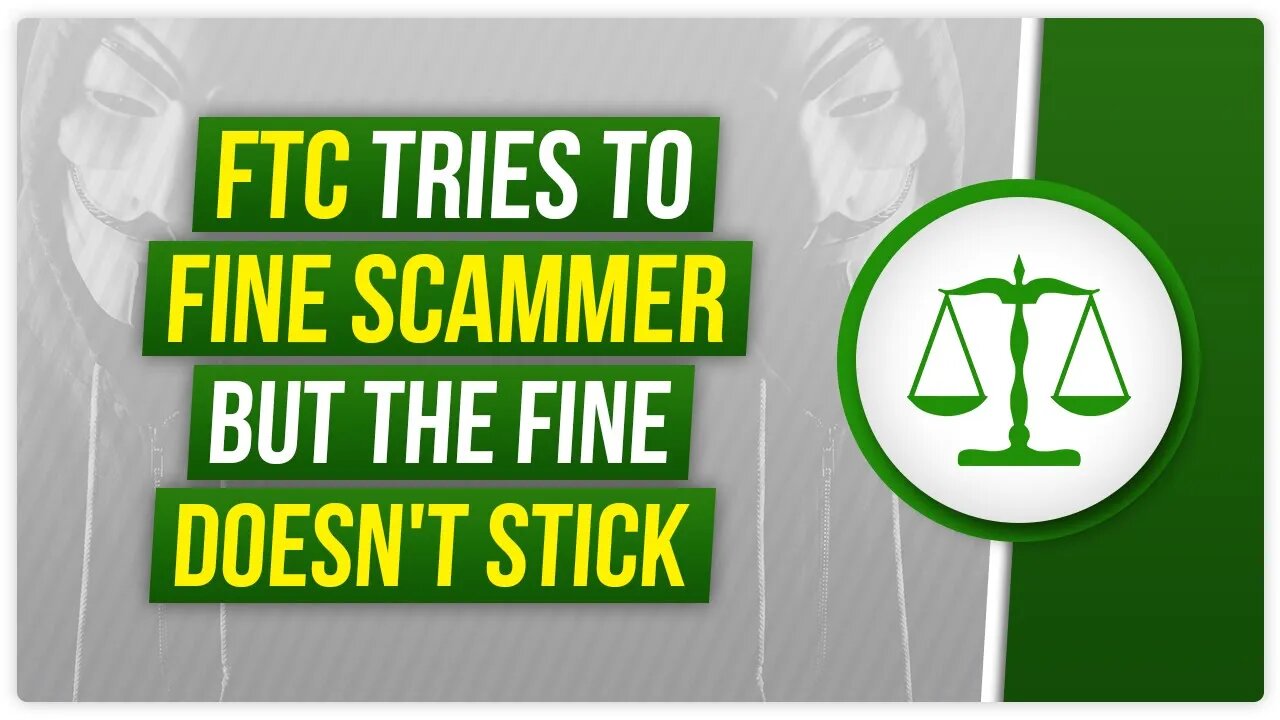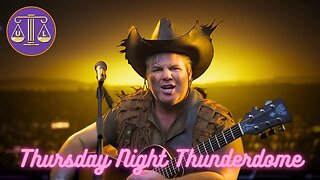Premium Only Content

FTC tries to fine scammer, but the fine doesn't stick - Internet Law Review
The FTC enforces federal consumer protection laws that prevent fraud, deception and unfair business practices. The Commission also enforces federal antitrust laws that prohibit anticompetitive mergers and other business practices that could lead to higher prices, fewer choices, or less innovation.
FTC fines the scammers, who are destroying the small businesses, but scammers are not punished properly, that’s why scammers do scams again and looting the people by using fake data and scams. FTC should punish scammers, which is the only solution of the problem.
Whether combatting telemarketing fraud, Internet scams or price-fixing schemes, the FTC’s mission is to protect consumers and promote competition.
The FTC administers a wide variety of laws and regulations, including the Federal Trade Commission Act, Telemarketing Sale Rule, Identity Theft Act, Fair Credit Reporting Act, and Clayton Act. In total, the Commission has enforcement or administrative responsibilities under more than 70 laws.
A new Better Business Bureau survey of small-business owners found 67 percent of respondents said their businesses face more risks from scams today than just three years ago.
Consumers aren’t the only ones who have to keep their guard up for phone calls from scammers pretending to work for the government. Small businesses increasingly are becoming targets, too.
According to a new Better Business Bureau (BBB) survey of small-business owners, 67 percent of respondents say their businesses face more risks from scams today than just three years ago. The scams range from crooks asking for payments for merchandise the business never ordered to hucksters giving businesses fake checks.
Government agencies, aware of the growing threat, are taking action. For example, the Federal Trade Commission (FTC) — working with eight state attorneys general, the U.S. Postal Inspection Service and several other law enforcement groups — recently announced a coordinated crackdown against scammers who had conned small businesses out of more than $290 million.
For small-business owners — roughly 50 percent of whom are over the age of 50 — the message is clear: Keep an eye out for costly cons.
“Scams are a significant — and growing — problem for small businesses,” says Beverly Baskin, interim president and CEO of the Council of Better Business Bureaus. “Nearly two-thirds of those we surveyed said their business had been targeted by a scammer in the past three years, and many said that their businesses suffered a loss of consumer trust as a result.”
Both the FTC and BBB say that one of the best ways that small businesses can protect themselves from scams is to stay informed about the different techniques used by people who try to take advantage of small companies. According to the recent BBB survey, 38 percent of respondents say that hearing about a particular type of scam is the best way to avoid falling victim to it.
According to the BBB report, six of the most common scams small businesses face are:
• Bank or credit card company impostors who pretend to be verifying account information but are really trying to get access to a business’s accounts
• Government agency impostors who threaten to suspend business licenses, impose fines or take other actions if the business doesn’t pay taxes or pay other fees
• Fraudulent services that promise to offer listings in business directories, advertising services or assistance that can help a business get better internet search-engine results
• Fake invoices or supplier bills cons, in which the scammers try to coerce small businesses into paying for products they never received
• Fake checks for purchases
• Tech support scams
Many of the legal actions the FTC and its partners took in the coordinated crackdown, dubbed Operation Main Street: Stopping Small-Business Scams, were against people accused of committing scams similar to those the BBB report warns of. Some of the other small-business scams allegedly committed by those facing charges as part of the crackdown include attempts to coerce small businesses into paying for supplies — such as toner and light bulbs — they never ordered and robocalls offering business loans and vacation packages.
“When someone scams or defrauds a business, they should be held accountable. In doing so, we create an environment where all legitimate business owners can thrive,” says Mark Brnovich, attorney general of Arizona, one of eight states that joined in Operation Main Street.
Thanks for watching our videos, Like them, comment your suggestions, share with your friends & don't forget to subscribe and click on the bell Icon, So you never miss any update from us.
-
 2:07:36
2:07:36
UncivilLaw
1 year agoThursday Night Thunderdome - Starbucks, Waffle House, Santos & More
690 -
 3:45
3:45
BIG NEM
7 hours agoDiscover Your Ikigai: Finding Your Ultimate Purpose
6.5K1 -
 13:19
13:19
Dermatologist Dr. Dustin Portela
1 day ago $1.71 earnedDo You Have Sebaceous Filaments or Blackheads?
5.15K1 -
 2:21:35
2:21:35
Price of Reason
11 hours agoThe Establishment WORRIES about Elon Musk AGAIN! Superman Trailer Discussion! Sonic 3 Review!
39.6K2 -
 1:14:54
1:14:54
Steve-O's Wild Ride! Podcast
14 hours ago $15.64 earnedZac Brown Reveals The Secrets To HIs Success - Wild Ride #247
56.5K12 -
 4:16:43
4:16:43
JdaDelete
8 hours ago $11.48 earnedProject Zomboid with the Boys | The Great Boner Jam of 2025
29.4K -
 6:00:08
6:00:08
SpartakusLIVE
9 hours agoYoung Spartan STUD teams with old gamers for ultimate BANTER with a SMATTERING of TOXICITY
28.1K -
 1:50:39
1:50:39
Kim Iversen
10 hours agoShocking Proposal: Elon Musk for Speaker of the House?! | IDF Soldiers Reveal Atrocities—'Everyone Is a Terrorist'
73.9K162 -
 43:27
43:27
barstoolsports
13 hours agoOld Dog Bites Back | Surviving Barstool S4 Ep. 9
125K3 -
 5:13:04
5:13:04
Right Side Broadcasting Network
7 days agoLIVE REPLAY: TPUSA's America Fest Conference: Day One - 12/19/24
182K28